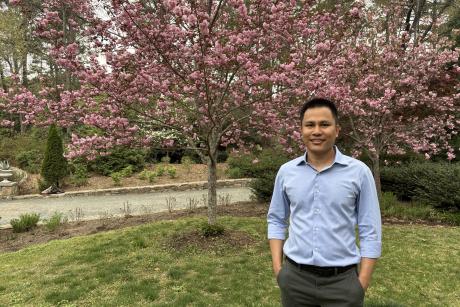Wenfeng Gong's graduate studies in global health at Duke were marked by a persistent question: Why didn't China have the same level of coverage for vaccines as other middle-income countries?
China’s national immunization plan didn’t then – and still does not -- include vaccines to protect against infections such as pneumococcal virus (PCV), hemophilus influenza type B (Hib) and human papillomavirus (HPV). “I was baffled by why China, an upper middle-income country lagged,” says Gong, who is now a senior strategy officer at the Bill and Melinda Gates Foundation.
After graduating in 2011 as part of the first cohort of the Duke Global Health Institute’s Master of Science in Global Health program, Gong pursued a Ph.D. in international health at Johns Hopkins University, where he began working with the university’s International Vaccine Access Center. During his first year of doctoral studies, he landed a highly coveted internship with the Bill and Melinda Gates Foundation.
"I spent that first summer working with the vaccine delivery team, and that was the beginning of three years of consulting opportunities with GAVI, the Vaccine Alliance, and the Bill & Melinda Gates Foundation,” he says. These opportunities allowed Gong to amass a vast network of professional contacts in the global vaccine scene.
Despite dreaming of joining academia after completing his Ph.D., Gong decided to take a fellowship offer at the Gates Foundation. "I had also gotten a job as an epidemic intelligence service officer at the CDC but what I really wanted was to develop my strategic and systematic thinking skills.,” he says. “The fellowship program was a great place to do that."
And develop his skills he did. Gong's first task was to figure out how to use advanced technology and machine learning for global development. In this role, he worked on developing tools to demystify vaccine demand challenges. “We partnered with the World Health Organization on this, and some of the measures we had contributed to are currently in use globally," he says.
This work led Gong back to his original question of why China was moving so slowly on new vaccine introductions. "Here we were years later, and not much had changed," he says.
Gong's work with disease modeling experts revealed a great opportunity to save lives and reduce social costs by accelerating the vaccine introductions in China; and he spent close to a year, with colleagues and partners, trying to understand the causes of the delay and set up a partnership to explore solutions.
When the COVID-19 pandemic began, Gong transitioned to be part of the global pandemic response efforts at the foundation. At the end of his fellowship, he accepted a full-time role with the foundation, overseeing its learning and strategy planning in China.
In January 2023, Gong was appointed an adjunct associate professor at DGHI, providing him with a chance to pursue another long-held passion. "This gives me a chance to work with students, conduct lectures, and collaborate with other faculty on research,” he says.
And what advice does he have for students who are just beginning their global health careers?
“Find out what you want to do, your passion, and your talent. If you want to teach or work in any organization that requires very high technical or professional expertise, go for a Ph.D. If you want to get into work after school, narrow down what part of global health you are interested in, as it is a very wide field.”



